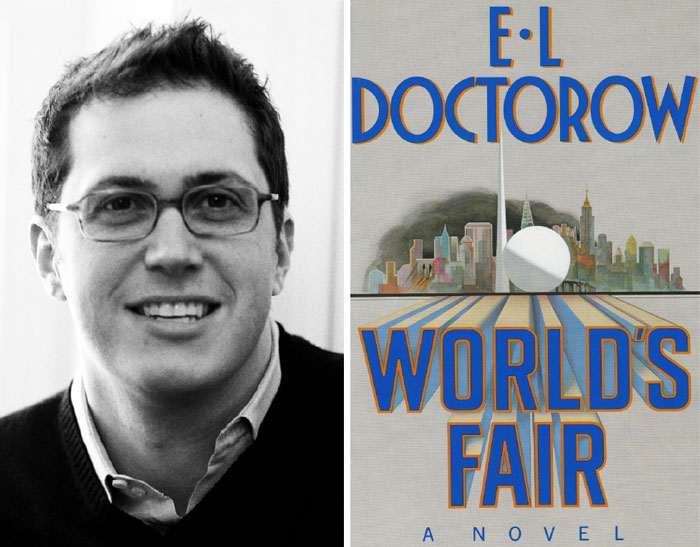The Book of Doctorow
Many writers seem daunted by the autobiographical novel—ashamed to write of themselves, as if that were either self-indulgence or exploitation. And of course with James Joyce and A Portrait of the Artist as a Young Man as a paragon, many do not even dare to try. But Joyce didn’t frighten off E.L. Doctorow, who mined his own Depression-era childhood in New York for the 1986 National Book Award-winning World’s Fair.
While Doctorow made a name for himself with The Book of Daniel, a fictionalized version of the espionage trial of Julius and Ethel Rosenberg, and is most widely known for a pair of historical novels that were made into movies—Ragtime and Billy Bathgate—it was Doctorow’s coming of age tale that affected me most.
It was Doctorow who taught me how honest, artful, telling detail rescues autobiography from cliché, imitation and nostalgia. He made it possible for me to write my forthcoming novel, In the Land of the Living, without feeling, as the American novelist John Gardner put it, “in the dark psychological set of the ambitious young novelist struggling to write down his existence as it is, with the ghost of the young James Joyce standing horribly at his back.” In World’s Fair, Doctorow attacked autobiographical material without fear—even giving the fictional Altschuler family the same first names as those of his own family. The book is told from the point of view of nine-year-old Edgar (Doctorow’s alter ego). He is caught up in the troubles of youth, and the Depression, the coming war and radical politics loom in the background.
E.L. Doctorow helped Austin Ratner, the award-winning author of The Jump Artist, conquer his fears.
Doctorow manages to emulate without imitating Joyce. The climax of World’s Fair, a much anticipated trip to the 1939 World’s Fair in New York, seems to come to the opposite conclusion of Joyce’s famous short story, Araby, about a boy’s disillusionment at a local fair. Edgar’s world opens, rather than closes, when visiting the World’s Fair. Nor does he attend the fair in hopeless isolation like the boy in Araby, but with Meg, his prepubertal first girlfriend. And unlike in Joyce’s story, promises aren’t broken but kept; Edgar’s father, inveterate and unreliable, uncharacteristically fulfills his promise to attend the Fair.
Jewish culture is a major source of raw material for Doctorow, but it never limits him the way Irish life does for Joyce. Rather, Judaism is an open system that tolerates questions, irony, ambivalence. Rose, Edgar’s mother, makes the conscious decision to circumcise her boys in the hospital without the traditional mohel. At the same time, Edgar’s paternal grandmother keeps kosher while his paternal grandfather quotes Thomas Paine against biblical literalism; his grandfather was, Edgar tells us, a socialist who “came of a generation of enlightened Jewish youth who understood…that religion was a means of holding people in ignorance and superstition and therefore submissive to impoverishment and want.”
Edgar’s maternal grandmother recalls the Cossacks’ pogroms in her Jewish village. The subject of Hitler, who has recently become chancellor of Germany, pops up in family discussions. Even in this context, however, Rose critically compares German Jews with Eastern European ones, a tension that may be familiar to many American Jewish immigrant families.
It was Doctorow who taught me how honest telling detail rescues autobiography from cliché, imitation and nostalgia.
Edgar merely makes observations. My favorite is his reflection on Jewish culture, one that I’ve felt too since my childhood: “I had the distinct impression,” he says, “that death was Jewish.” And his reflection on Passover is wonderful too: “It came along in the spring, but with that peculiarity of Jewish holidays of being very casual about the date of its arrival.”
Undoubtedly, I feel a special connection to World’s Fair in part because I understand these Jewish references, but their greatest importance to Doctorow’s art is as a means of seeing the global through the prism of the particular, not as a defense of the particular against the larger world or an exhortation to destroy the particular to access the world beyond. Even Doctorow’s use of childhood is incidental except as a technique of defamiliarization, a trick to reinvent the mundane afresh.
Now that I’m publishing an autobiographical novel, I take courage from his confidence in the authenticity of fiction based on real experience. There are critics who have objected to World’s Fair’s commonplaces, but with Doctorow as my guide, it’s not the plot or the subject that matters. For a magic bard like him, any part of the reality of this great mundus will shed light on the glory of it all.



